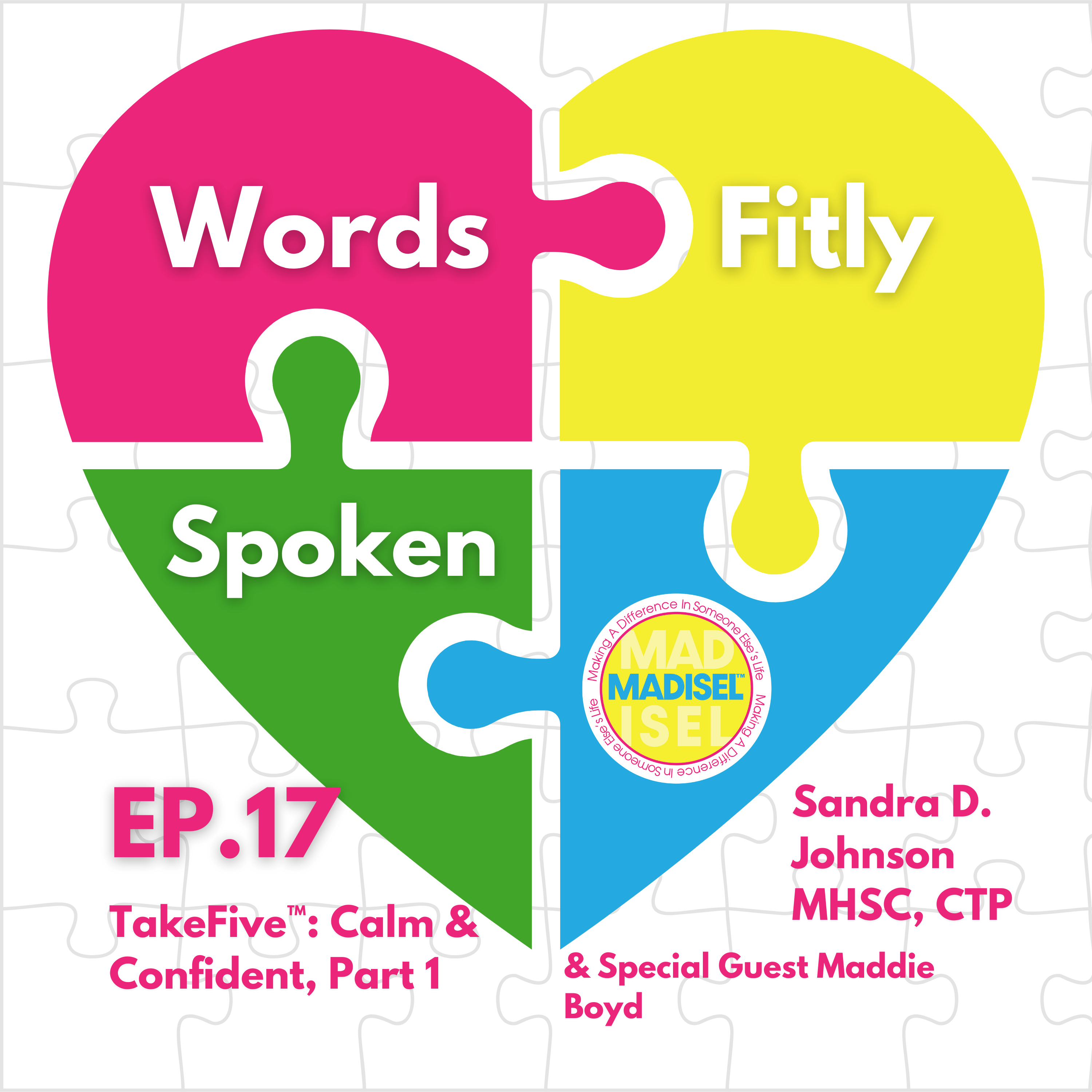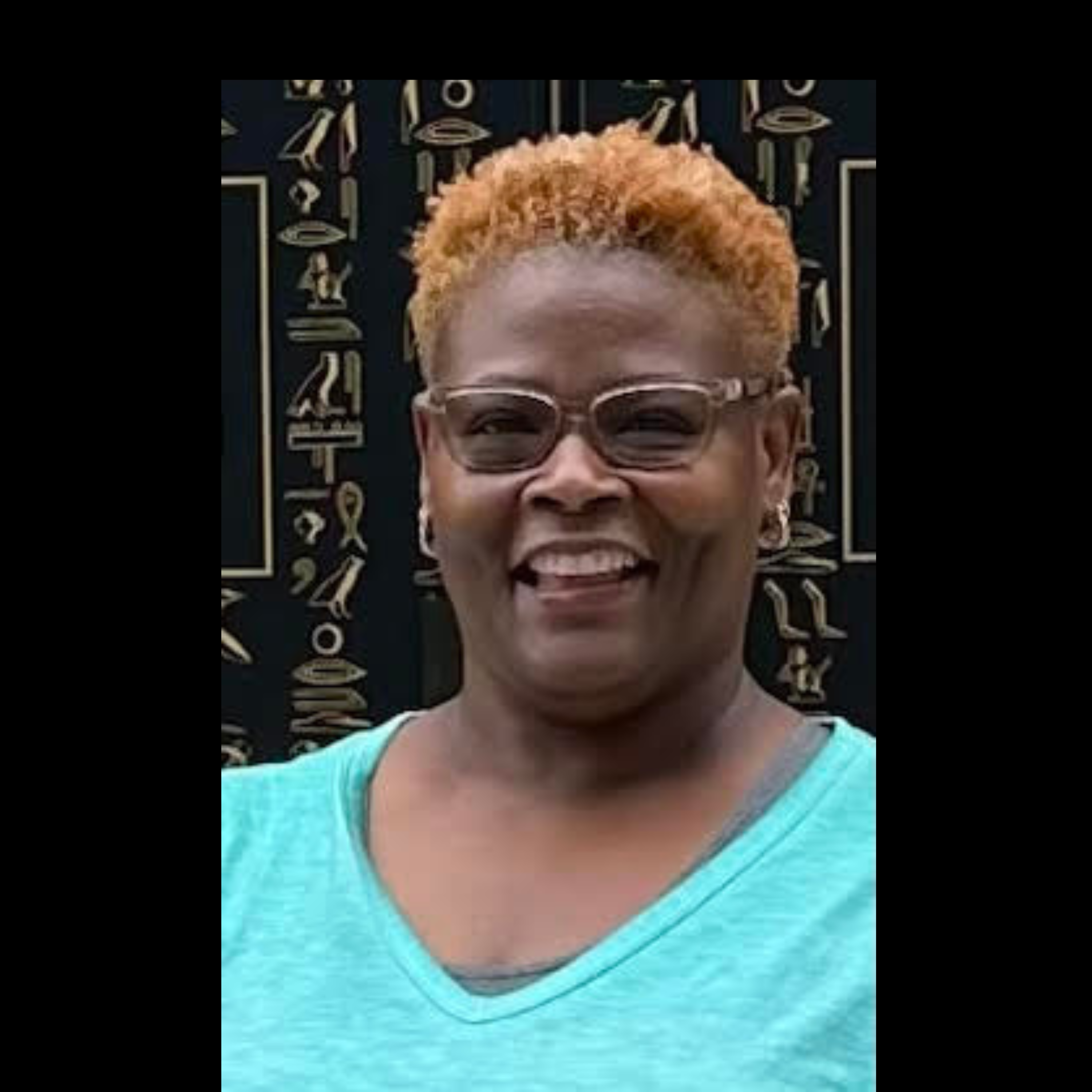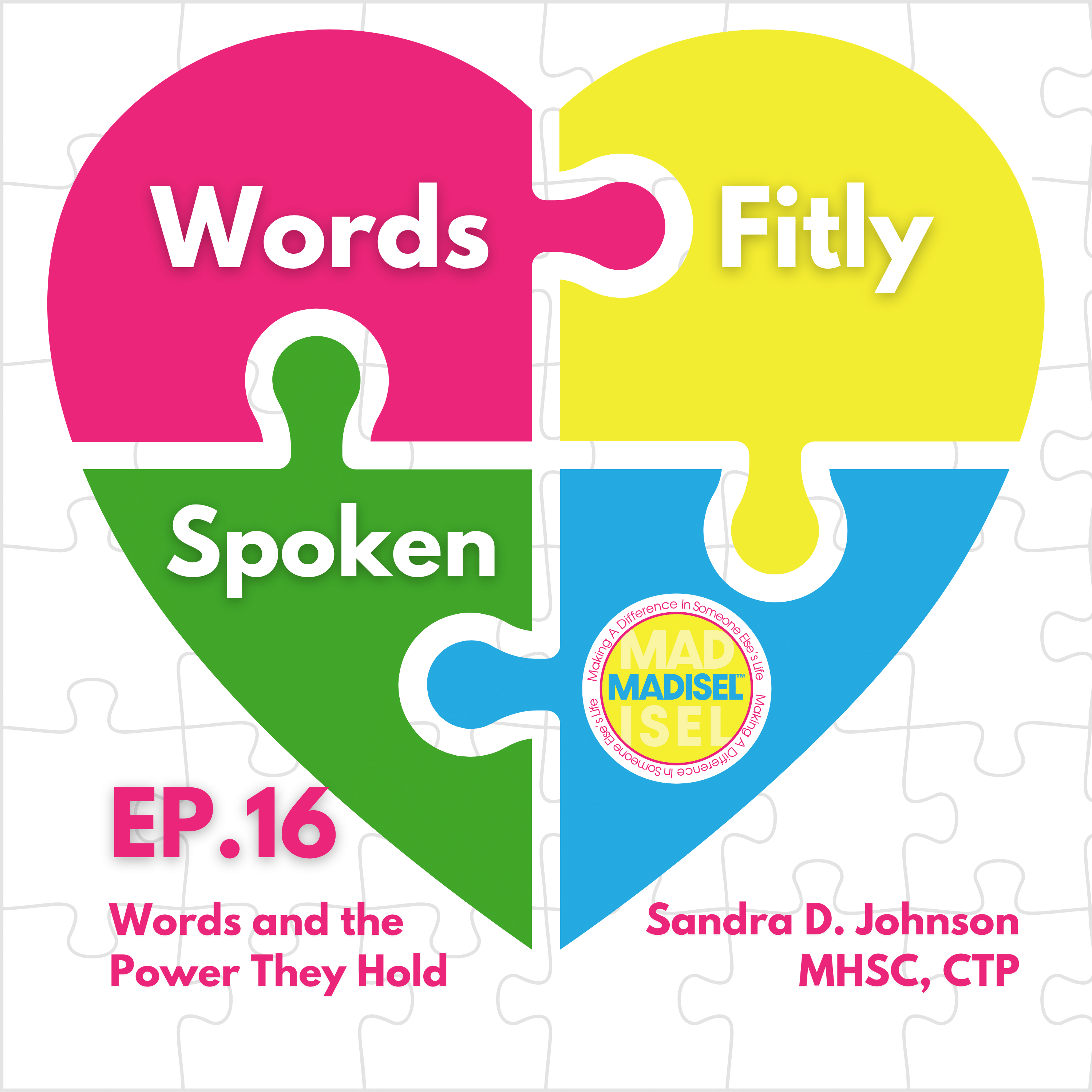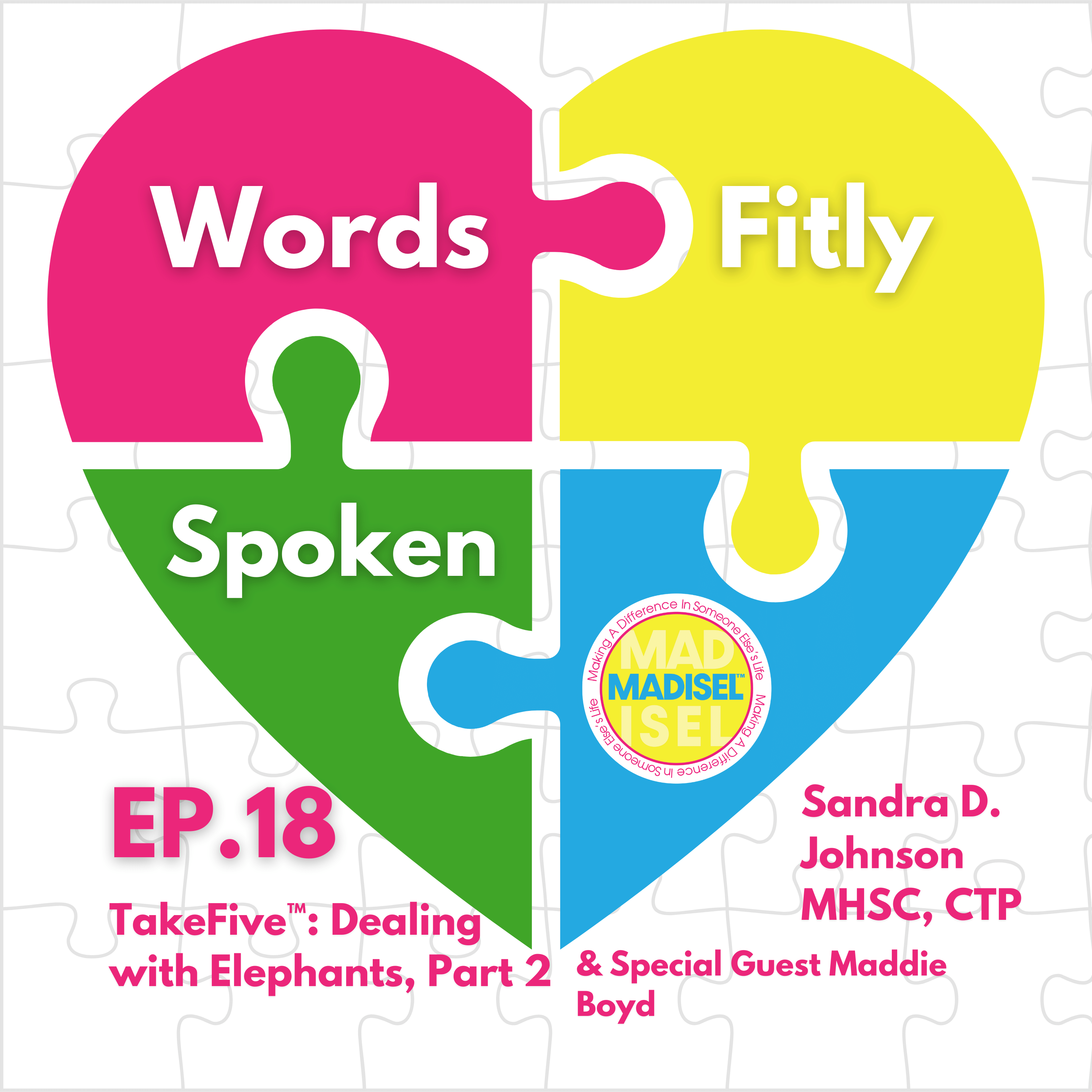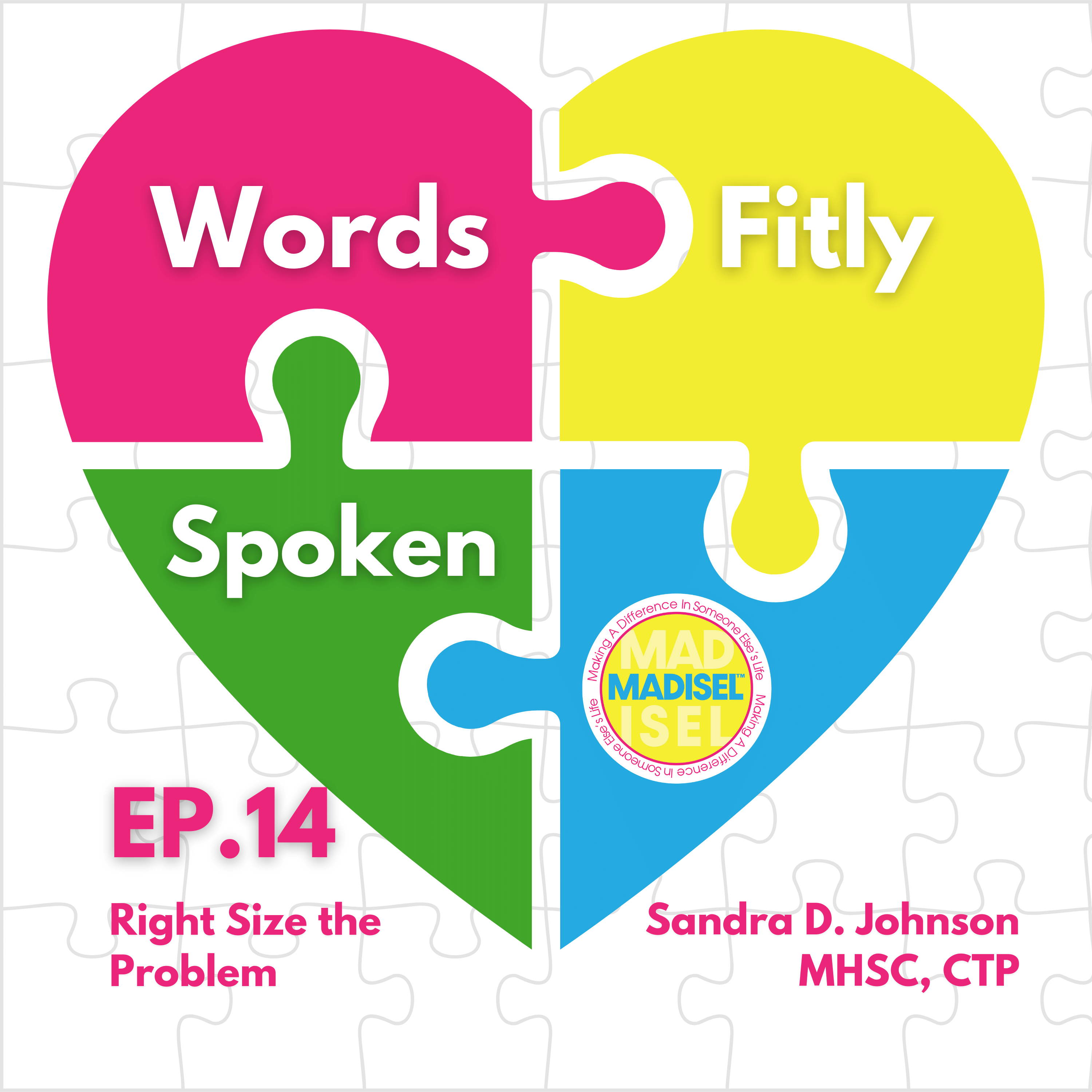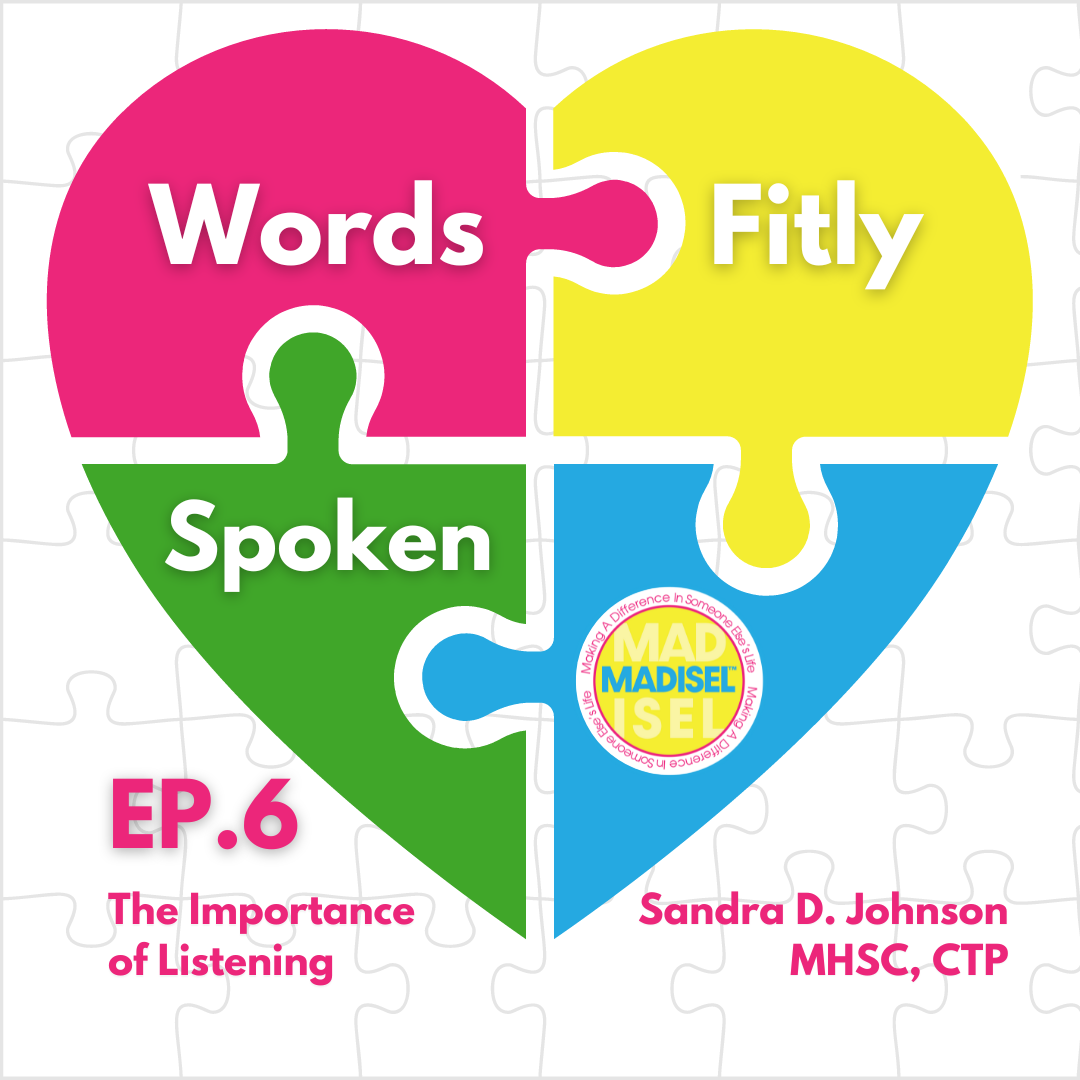Big Welcome Back to Maddie! Our UNF College Intern, Maddie Boyd, has come back to discuss another topic with us. TakeFive™ is a new product that is packed with helpful thoughts to support our emotional and mental wellness. We discuss the first 3 action steps of the TakeFive™ concept.
View Full Transcript
Episode Transcript
Welcome to at MADISEL Coach and MADISEL TV's Words Fitly Spoken podcast. Hello there. I'm Coach Sandra, and I'm the host of Words Fitly Spoken podcast. Words Fitly spoken are words spoken at the right time for your encouragement and enrichment. On this podcast, we will deal with emotional and mental wellness by talking about the conflicts we have in our everyday relationships, whether at home, work, school, and the community.
Stop in to hear some helpful words that create awareness about your emotional health.
Welcome, welcome, welcome back in to Words Fitly Spoken, the podcast dealing with emotional and mental health support. So I am coach Sandra and I have brought back our special guest, the MADISEL group intern Maddie. Welcome back. Thank you for having me again. Absolutely. Thank you for coming back in.
So Maddie, today what I wanted to talk about is there's a concept that, uh, you have been working on with me and we call them individual cards. But I actually have adjusted the title to be take five because there's five cards that give some emotional support for anyone who is participating in these cards.
And so what happened? With Maddie and I last week, we had an opportunity to present this information to a group of teenagers and their parents. And we had a great turnout. We had some great involvement. So Maddie, I wanted us to just come to the podcast today and share it with our other audience. How, you know, we're going to interact with Take 5 and what Take 5 is about.
So what I'm going to do is just share with the audience. When you are working on your emotional wellness at any level, so whatever you may be dealing with, um, or concerned about taking the time to getting your, yourself set, I guess is a good way to look at it when we talk about this take five. So Take five is not just the cards.
It could be, Hey, take five minutes, right? Take five minutes to just process what is actually going on. Um, I was having a conversation with someone else and I had asked them, you know, to explain what they were going through. And sometimes with teenagers, I get the answer. I don't know. And what I've said to them, Maddie, is that, and you've probably heard me say this, I don't accept, I don't know.
Right. Because you're the one experiencing what you're experiencing. You may not have the words right now, but if you will, maybe take that five minutes to slow down and to process what's actually happening, you're going to learn some things about yourself that you need to know. Yeah. Because I believe each one of us has a responsibility to become an expert on ourself.
My job in life is not to be an expert on Maddie. I didn't come here for that, right? I need to be an expert on me. I need to know how I'm feeling, how I'm thinking, what my emotions are doing. And specifically, as I'm recalling the conversation, I was wanting this young person to know what their body was doing when anger was starting.
And that is very important if we really want to deal with working through anger issues. I got to know what my body's telling me. What, what is, what, what are you feeling? And that could be, um, you might have what some people would call a hot flash. You might, um, you might feel, um, tension in your stomach.
Sometimes you'll feel a tightness in your neck. Everyone is going to have different physical reactions to the, all the different emotions, but anger sometimes is a lot more pronounced than all of our other emotions. And it's important that we know what our body's telling us because we can avoid some of the troubles or the extra conflict that comes because of anger.
If I just start to recognize, wait a minute, I'm feeling tension. So I need to pause. Yeah, I need to take five. I may need to take 15, um, and, and do something a little bit different. So as we talk about take five, we're going to introduce you to these five things. And they are practice stillness, find your calm, check your confidence, learn to trust.
That's a major one. And the last one is face the elephant in the room. Oh, one of those statements. That is really interesting. And what I'm really encouraged by, though, I had the, I put in the, the, the thought, the work to. Put these five cards together. I want to just totally give major props to Maddie, my UNF intern.
Okay, because what she did and helped me as the family coach, she helped organize these five items. And so that's another reason why I'm honored to have her as a guest today because she helped take this material and put it in more of a walkable position for anyone who participates in Take 5. So Maddie, I'm going to ask you to start us off.
Tell me, uh, tell our audience as well. When we talk about practicing stillness, what would be a highlight of that for you? First of all, thank you for mentioning that. But for me, practicing stillness is just making sure that you know where your own thoughts are. You're not all over the place thinking about a hundred different things, thinking about the past and thinking about the future.
If you're just making sure you're thinking about the present and what you're feeling in that moment. That's really, really important because if you're thinking about the past, if you're thinking about the future too much, then you're just going to get completely jumbled and you're not able to focus on exactly how you're feeling right in that moment.
And if you don't know how you're feeling in that moment, there's no way you can communicate to anyone else what you're feeling. And that's where, you know, a lot of miscommunication happens, arguments can happen. Major. All of that kind of stuff. Yeah. I love it. Thank you so much for, for triggering, uh, those extra thoughts for me.
So in writing this material and putting it together, I had been doing my own personal research in the, uh, topic of mindfulness and those who are not familiar, familiar with mindfulness, it really helps you to begin to practice what it is to be mindful, to live in the present. And so one of the, and the author that I have researched and continue to research is John Kabat Zinn.
And so one of the things that I learned in his books is how we all walk around the earth. We're either living in the past that we cannot change or hoping for a future that may or may not come. Which means we're never living right here. Right now so I begin to remind myself. I need to practice right here right now And just for anyone watching us We're sitting in this studio Maddie and I it's a Thursday.
It's the afternoon and we're here, right? And so practicing stillness would just was really about being mindful Like Maddie said what is going on inside of me? What is going on? I can say for me today earlier. I was stressed. I got stressed because of some family dynamics Of my own personal family and some other families that I work with and so I took on I needed to stop And recognize that.
Absolutely. What, what do you, what, what is something maybe today or anytime this week where you've had to just practice some stillness? Um, you know, for the audience, I do play volleyball, so it's really, really important to make sure that when we're practicing, when we're lifting, oops, um, any of, any of those type of things, we're completely in the moment that we're in, because if you're not practicing, You know, any type of movement or anything with intentionality, then you're not doing it into your, you know, best ability.
So just making sure that we're, you know, be where, be where our feet are, um, especially in practice because it's just not worth it to be there when your mind is thinking about a test you need to take or any other type of stress. It's just not, it's not healthy. It's not, you know, your best. Excellent.
Excellent. So Maddie just highlighted another statement that fits practicing stillness. It's be where your feet are. Recognize where you're at in that moment and be right there. And you know what? Practicing stillness is you can literally be still. And for a lot of us, we don't do it. We think we always have to be in a hurry.
I've always got to take care of this. I'm running, I'm running to this. I'm running to that. I'm running from this. Slow down. Breathe. You're valuable. The people you deal with are valuable. The situation is valuable. Enjoy it. Be a beautiful way to say it. Excellent. All right. So that's where we start, right Maddie?
So we want to start with that practicing stillness. What would be next? Where do we go from there? So once you have a really good recognition of where you are, what your feelings are, then you have to be able to go back to that in a, you know, in an environment where you're angry or you're upset. That's where the challenge comes in because right now, you know, we're pretty calm sitting in this studio.
It's pretty easy to practice stillness. Um, but once you're in the situation where you are upset or angry, you have to find your calm. Okay, that's a good one. Find your calm. So what I'll tell you all is the reason I say it that way is specifically To deal with the issue of not telling someone to calm down.
When we say it that way, you're making a demand. Now, if it is not, let me say it this way. If it is a life and death threatening situation, it might fit. But most times when we say the phrase, there is no life or death threat going on. There is no, no reason to be so aggressive and sometimes we're that aggressive by demanding someone calm down because we feel uncomfortable.
Yeah and then it usually just escalates the situation. Absolutely. So calm down doesn't work. No. It works the opposite or work against you when you are commanding or demanding that someone respond to you in that moment, you need to calm down and your emotions and the energy goes up. Yeah. Right. And then you have to defend.
So then we get into this tug of war type of situation, which is called a power struggle. And when you're struggling for power, Probably no one's going to make their point. No one's going to be heard because we are struggling like a tug of war for power. I believe I'm right. The other person believes they're right.
So we're never really listening. We're never working on a resolution. Yeah. Right. So in finding your calm, that's an individual responsibility. And what I found is If you were the person in this conflict with me, or you were telling me about a conflict that you had, it would be wrong for me to give you a command or a demand because it changes the whole dynamic of our conversation.
I then become someone who you feel is trying to attack you as well. Yeah. Right? One more person to add to that already long list. So to keep me from doing that, I invite you, I say, Hey Maddie, let me give you some time to find your calm. It changes the conversation. Absolutely. Right. You don't have to go into a defense mode.
Right. You can, I'm saying to you, I see you. I recognize your stress right now. So I want to give you space and time to find your calm. Thank you. I think this could help with parent the parent child conflict. What do you think when there's a conflict at the house? Yeah I definitely think that this would help with a parent and child because it makes you feel almost like you're on an equal playing field Rather than the adult is demanding and making the child feel maybe less than because they are Emotional.
And so when, I feel like when you're emotional, the one thing that you really don't want to do is feel like you're being irrational. You, you want your emotions to be validated by whomever you're talking to. Because you don't want to think that, you know, all my emotions are just completely irrational. Why am I even feeling this way?
So I think that, you know, inviting someone to find their calm, not only doesn't demand, but it validates, I know you're feeling this way. And that's okay. Yeah, but we're not going to get to a resolution if you are in this type of behavior where you're acting, acting out or acting out of anger. Very good.
And I'll tell you something else that just triggered in me is in the dynamic, if, if we would use this phrase, okay, test it out. I challenge you to test out, find your calm. Um, it also creates this beautiful safe space, like you were saying with the validation, but it also helps to create a safe space of, I don't have to understand in that moment.
Like I'm not coming in here to fix what I, what's broken, right? So like, I don't deal with you like you're broken. I deal with you like you're me. Right. You're human. Right. You're valuable. Right? So, by finding your calm, you, again, you get to feel like you are being heard. But even in that situation, I don't have to know all the details.
And sometimes, um, as the authority, as the parent, uh, there will be a rush in to fix whatever's amiss. Let me fix it. And in that, we never hear what. Is really hurting them right and it could be I don't need to be fixed I just need for someone to notice me Right. I need for someone to to help me and that's where the validation comes in and me understanding You didn't come in here with your stress or with your issue for me to fix it for mommy to make it better Okay, just using mommy as an example Daddy to make it better You know, whoever it is, uh, girlfriend, make it better.
Boyfriend, make it better. The boss, let me let the boss make it better. No, none of us need to make it better. I just need to know that you are struggling with something and I don't need to fix it. I need to remind you that the gifts are in you. You're empowered and you don't know it because your emotions are so high.
You can't maybe. Think clearly or feel safe, even in your own emotional journey that you're going through, right? Yeah, you might be scared terrified and Just by me giving you permission To say hey take some time to find your calm Find your calm not my calm. Mm hmm. I don't need you to calm me down I don't need you to keep me from being frustrated And by me doing that, that's me making your issue about me, instead of your issue being all about you.
Yeah. Yeah, I think that's a really good point too, is letting them find their own calm, because I think there's a lot of times where parents, they want the best for their kids, but they overdo it to the point where the kid doesn't know how to do it themselves anymore. Excellent. And then… You know, you go to college and there's going to be emotional times, especially your freshman year of college.
It's a huge transition, maybe one of the biggest in your life. And there's going to be times where you have to manage your own emotions. And if you've never done that before because someone is constantly doing it for you, that's going to be really challenging and it's not impossible. And it might be a good learning curve for some people, but allowing them to work through it themselves before.
before they're in the situation where they have to is a really good idea. Excellent. Excellent. So I love that you brought that in. And this is just step two in the take five process. But Maddie just highlighted a great piece for the family journey. Remember that whatever age your young person is, if they are under the age of 18, Then they are, you're preparing them, they're being prepared for what is next, right?
And so for some of us, what, what was next is going away to college or going to college, being involved. And even if it's not the college setting, it might be the workforce. Same thing though. You're going to be faced with how are you going to manage your emotions? Yeah. And if I've never practiced at my home address is going to be an incredible challenge at the school address or your new apartment or this new place you're in in life because the home wasn't a safe place to practice these skills.
Yeah. We've got to get back to making the home a safe place to practice these skills. Absolutely. Yeah. So thanks for bringing that up. We threw that in for free, but it's a key piece that we got to deal with. And um, let's go to the next one. What's on the, what's on the list next? Next we have confidence.
Confidence. Wow. Oh yeah. So a lot of people, I hear a lot of us really at multiple ages. I think I can say from. In my own experience, I have heard a five year old struggle with confidence and an 80 year old. So everybody in the middle of those ages. So from five to 80, right, from those, those, those kindergarten ages to senior citizens.
So confidence is a major issue for all of us as humans. Yes, it definitely is. So how does it fit into the steps? Well. I mean, confidence is just something that you have to have to be able to have, you know, hard conversations. Because if you're not confident in yourself when you're addressing somebody, you can be taken advantage of, not listened to, um, all those kinds of things where it makes a really difficult conversation.
And I think being confident, I think a lot of people think, If I wasn't born with this innate confidence, or I'm not like my friend over here who is just confident in anything that they do, they think that they just won't have it or that they can't build it. Right. But I think that that, I think, you know, you have a different opinion about that.
Yes, indeed. So, because confidence is renewable. I actually call it the renewable energy. If you really think about it. Your confidence is going to get hit at different times in life. So there's obviously something in us that maybe we don't talk about enough at the dinner table or with our peers. That's probably not a topic that we're texting about.
Um, you're checking your friends and saying, Hey girl, how's your confidence today? Right. But we need to check on each other that way. Yeah. Ask about confidence. Ask mom, how is your confidence? Right. Ask dad, ask the teenager, ask, ask the seven year old. Tell me about your confidence. Now we may have to explain what it means.
It's believing something. It's believing that you can. It's OK. Even if you fail, you can pick it back up and do it again because your confidence. is a renewable energy. We need it. We absolutely need it in life. Um, but knowing that it will be hit, it will be, it's going to be challenged. Um, you're going to have bad days.
You know, something that comes up also, um, we sometimes have used some phrases like, um, you know, thinking we have to be perfect, which is. Not true. Um, also thinking that, um, it's not okay to fail, right? Like, oh, and please know our best lessons. Can truly come in our failure. Failure is actually good for us.
Um, let's just say, um, I've done the workout. So as an athlete for you, you've done your workouts, you thought you were prepared. And maybe there was a team or maybe there was a time that you didn't get picked or you didn't get to be in the starting lineup. And it's like, man, I'm not being called on what's going on.
And that affects your confidence, right? So speak to that as an athlete, um, how confidence fits into that. Yeah, I think that confidence is one of the most important things that an athlete can have because, you know, you can have all this talent, but if you don't have the confidence to do what you know you need to do with it, um, it's just not going to work.
I think that one thing that my coach says a lot is there's no failure. There's only feedback. So even when you quote unquote fail, You, you, you know, you don't reach the metric that you were going to. That's okay. You know, you failed there, you know, you didn't reach it, but now you know why you didn't reach it.
Excellent. So if you're trying to get to a certain number, a certain whatever metric that you're trying to do, and then you don't get it. You know why, you know what happened, you know what mistake you made, and you know what you didn't do and now what you need to work on. And so I think that that's really important is even when you fail, your confidence doesn't have to just completely fall, go out the door.
That's good. It can waver. Yeah. And it will waver. That's good. But being able to be hopeful for the next thing and have that feedback and say, okay, I have this feedback and I know what to do with it. So now you have hope for whatever, you know, endeavor that you're going to take next. Wonderful. So, what I heard there was this, If I become a student of my failure, That's going to help my confidence.
Excellent. You guys, you're hearing some really powerful stuff from this young adult right here. I love that. That's a great piece to put in there. Let's make sure that we become students of our failures instead of thinking that, um, it's all over. Yeah. And say again what coach says. There's no failure.
There's only feedback. Feedback. Bring it on. Yeah. I love it. That's excellent. Excellent. Excellent.
